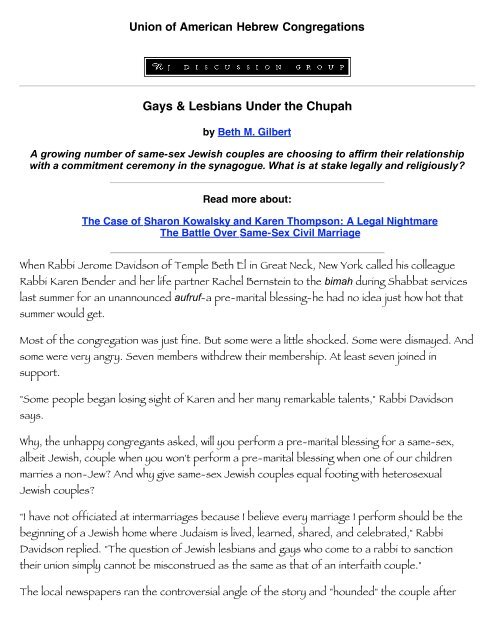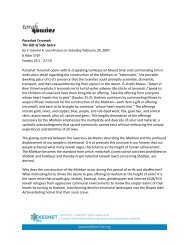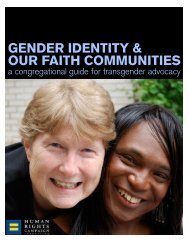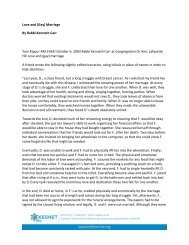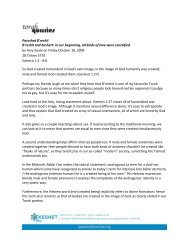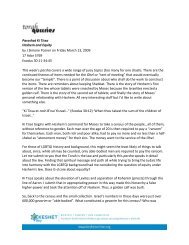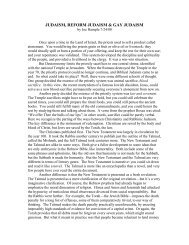Gays & Lesbians Under the Chupah - Keshet
Gays & Lesbians Under the Chupah - Keshet
Gays & Lesbians Under the Chupah - Keshet
You also want an ePaper? Increase the reach of your titles
YUMPU automatically turns print PDFs into web optimized ePapers that Google loves.
Union of American Hebrew Congregations<strong>Gays</strong> & <strong>Lesbians</strong> <strong>Under</strong> <strong>the</strong> <strong>Chupah</strong>by Beth M. GilbertA growing number of same-sex Jewish couples are choosing to affirm <strong>the</strong>ir relationshipwith a commitment ceremony in <strong>the</strong> synagogue. What is at stake legally and religiously?Read more about:The Case of Sharon Kowalsky and Karen Thompson: A Legal NightmareThe Battle Over Same-Sex Civil MarriageWhen Rabbi Jerome Davidson of Temple Beth El in Great Neck, New York called his colleagueRabbi Karen Bender and her life partner Rachel Bernstein to <strong>the</strong> bimah during Shabbat serviceslast summer for an unannounced aufruf-a pre-marital blessing-he had no idea just how hot thatsummer would get.Most of <strong>the</strong> congregation was just fine. But some were a little shocked. Some were dismayed. Andsome were very angry. Seven members withdrew <strong>the</strong>ir membership. At least seven joined insupport."Some people began losing sight of Karen and her many remarkable talents," Rabbi Davidsonsays.Why, <strong>the</strong> unhappy congregants asked, will you perform a pre-marital blessing for a same-sex,albeit Jewish, couple when you won't perform a pre-marital blessing when one of our childrenmarries a non-Jew? And why give same-sex Jewish couples equal footing with heterosexualJewish couples?"I have not officiated at intermarriages because I believe every marriage I perform should be <strong>the</strong>beginning of a Jewish home where Judaism is lived, learned, shared, and celebrated," RabbiDavidson replied. "The question of Jewish lesbians and gays who come to a rabbi to sanction<strong>the</strong>ir union simply cannot be misconstrued as <strong>the</strong> same as that of an interfaith couple."The local newspapers ran <strong>the</strong> controversial angle of <strong>the</strong> story and "hounded" <strong>the</strong> couple after
<strong>the</strong>y returned from <strong>the</strong>ir wedding in California. It became <strong>the</strong> talk of backyard barbecues and alively debate on same-sex marriage with over 200 entries on <strong>the</strong> Internet.Overall, however, Rabbi Bender says, <strong>the</strong> response to <strong>the</strong> wedding was overwhelmingly loving."Rachel and I received wedding gifts and heartfelt notes from 250 families. The temple got sevenpieces of hate mail."The controversy aside, Rabbi Bender says she can't imagine not having had a Jewish pre-maritalblessing or wedding.These moments were pure joy," she says, "Our wedding was a natural step for us-a personaldecision, not a political statement. Jewish ceremonies are very important to us. Why should we bedeprived?"An Opportunity to WedSuch weddings are no longer an isolated phenomenon. A growing number of Jewish same-sexcouples are choosing to solemnize <strong>the</strong>ir relationship with a life-cycle ceremony. Some call it awedding, some a commitment ceremony, o<strong>the</strong>rs kiddushin or sanctification.Within a year, Hawaii may permit lesbian and gay couples to marry. As no state currentlyrecognizes same-sex marriages, it is likely that hundreds of gay and lesbian couples will decide toseal <strong>the</strong>ir vows in that state.A great deal is at stake here. Legal marriage would afford lesbian and gay couples a host of rightsand responsibilities currently benefitting heterosexual married couples, among <strong>the</strong>m power ofattorney; status of next-of-kin for medical and burial decisions; joint insurance policies; jointleases; and spousal employee benefits such as health insurance annuities, pension plans, socialsecurity, and Medicare. Partners would be entitled to take care of one ano<strong>the</strong>r should ei<strong>the</strong>rbecome seriously ill, avoiding tragedies such as <strong>the</strong> one Sharon Kowalsky and Karen Thompsonexperienced (see page 20). They would be able to adopt one ano<strong>the</strong>r's child, as well as securejoint parenting and foster care, a benefit provided by only a handful of states.Reform and Same-Sex MarriageThe Reform movement is on record as supporting civil marriage for gays and lesbians. In 1993 <strong>the</strong>UAHC resolved "to oppose state and local statutes restricting <strong>the</strong> civil rights of gays, lesbians, orbisexuals, and to call upon governments to adopt legislation affording committed lesbian and gaypartners spousal benefits; ensuring that lesbians and gay men are not adjudged unfit to raise
children; and affording partners <strong>the</strong> means of legally acknowledging <strong>the</strong>ir relationships." LastFebruary, <strong>the</strong> executive committee of <strong>the</strong> Commission on Social Action of Reform Judaism passeda motion acknowledging that this means "to recognize legalizing same-sex civil marriage." And lastMarch, <strong>the</strong> Central Conference of American Rabbis passed a resolution supporting civil marriagefor gays and lesbians.The Reform rabbinate, however, has not yet called such relationships kiddushin. In 1990 <strong>the</strong>CCAR accepted a report of its Ad Hoc Committee on Homosexuality and <strong>the</strong> Rabbinate whichacknowledged that a lesbian or gay relationship may possess ethical and spiritual value butreserved <strong>the</strong> special status of kiddushin for monogamous, heterosexual, procreative marriage.That position is now being reevaluated by an ad hoc committee on Human Sexuality.While advocating for change, <strong>the</strong> UAHC Task Force on Lesbian and Gay Inclusion realizes that<strong>the</strong> issue of same-sex commitment ceremonies will, indeed, take time to be fully accepted. NotesRabbi Julie Spitzer, regional director of <strong>the</strong> New York Federation on Reform Synagogues andstaff director of <strong>the</strong> Task Force: "While <strong>the</strong> Task Force members are strong advocates for <strong>the</strong>full and uncompromising integration of lesbian and gay individuals and families in all aspects ofsynagogue life, we spent considerable time discussing <strong>the</strong> issue of how strongly to advocate forkiddushin in our new manual, 'Kulanu-A Program To Include Lesbian and Gay Jews in OurTemples.' Ultimately, we agreed to acknowledge rabbinic authority in ritual matters and toencourage clergy and lay leaders to thoroughly examine <strong>the</strong> issue in light of Reform Jewishteachings. It was a difficult compromise, but ultimately an important recognition that <strong>the</strong> task ofstudying this issue and guiding our congregants is ongoing."Rabbinic Controversy RemainsReform rabbis remain divided on <strong>the</strong> kiddushin question. Rabbi Jeffrey Salkin, senior rabbi ofCentral Synagogue of Nassau County in Rockville Centre, New York, says, "At this time I do notfeel comfortable sanctifying those unions. I support, appreciate, even empathize with <strong>the</strong>secouples. But, because of my readings of Jewish history, tradition, <strong>the</strong>ology, and liturgy, I cannotuse <strong>the</strong> word 'sanctify.'"I tend to be a traditionalist," he adds. "But as a true liberal, I'm not offended by rabbis who takea different view. No one has asked me yet to perform a same-sex ceremony. Although I wouldn't, Isuspect I would refer <strong>the</strong>m to someone who would."Rabbi Ronne Friedman of Temple Beth Zion in Buffalo, New York will participate in same-sexwedding ceremonies, calling his decision "an intuitive response to what ought to be." He views it as
a civil rights issue that he expects will not be resolved in <strong>the</strong> '90s. "I fear it will be <strong>the</strong> civil rightsissue into <strong>the</strong> next millennium," he says.Rabbi Michael Stroh of Temple Har Zion in Thornhill, Ontario believes that Reform rabbis shouldnot officiate at same-sex marriage ceremonies but acknowledges that his position is not an easyone for him. "I know and respect colleagues who are gay or lesbian," he says. "Frequently, <strong>the</strong>irpositions on Jewish issues are closer to my own. I do not want to cause <strong>the</strong>m pain. I'd like to saythat, as a modern person, I accept homosexuality as <strong>the</strong> equivalent of heterosexuality. But Icannot. I do not believe that this is <strong>the</strong> case. Nor do I believe that, from a Jewish point of view,heterosexual and homosexual relationships are equivalent. I'm not saying that homosexuals donot have <strong>the</strong> right to companionship. I am saying that, at this point, I am not prepared to performa Jewish marriage ceremony."Congregants, too, have expressed ambivalence about rabbinic officiation at commitmentceremonies for lesbian or gay couples. "I don't care if my rabbi officiates," says one mo<strong>the</strong>r ofyoung children, "as long as my children don't know about it." One Reform congregation permits itsrabbi to use <strong>the</strong> sanctuary for commitment ceremonies but will not permit him to call same-sexcouples to <strong>the</strong> Torah, fearing that <strong>the</strong> family and guests of <strong>the</strong> Bar/bat mitzvah might beoffended.In his Rosh Hashanah morning sermon last year, Rabbi Jerome Davidson disputed <strong>the</strong> notion thatsame-sex marriage offends family values. "First," he pointed out, "it provides an option for gayso<strong>the</strong>r than a life of loneliness, of hiding, that is true to <strong>the</strong>ir real identities. Second, <strong>the</strong>y cancreate a truly Jewish home toge<strong>the</strong>r, live Jewish lives, and, if <strong>the</strong>y choose, raise Jewish children.Finally, a gay and lesbian union can be an instrument of reconciliation among children, <strong>the</strong>irparents, and <strong>the</strong>ir siblings. Having been kept apart by years of continuing fear, stigma, andridicule, <strong>the</strong>y can come home again."Rosanne and OraDr. Rosanne Leipzig would agree with Rabbi Davidson. Most of her large family had figured shewas a workaholic, married to her career."I maintained a superficial relationship with various aunts and cousins," says Rosanne, a physicianspecializing in geriatrics. "I'd had enough rejection when I told members of my immediate family Iwas a lesbian."But eight years ago, when Rosanne and Ora Chakin, members both of Beth Am, The People'sTemple and Bet Simchat Torah in New York City, decided to marry, Rosanne wrote a letter to her
extended family explaining that, yes, I am a lesbian. And, yes, this wedding ceremony has <strong>the</strong> sameemotional significance as any o<strong>the</strong>r wedding in <strong>the</strong> family. And, yes, I probably should have toldyou sooner. But we'd like you to be <strong>the</strong>re.Some sixty letters went out. With three exceptions, everyone responded. And almost everyoneattended <strong>the</strong> wedding."They were incredibly caring," Rosanne says of her family. "Most felt that if I was happy, well, itwas okay. Clearly, some were uncomfortable, but <strong>the</strong>y came to show <strong>the</strong>ir support."Ora says it was great to see everyone ga<strong>the</strong>red toge<strong>the</strong>r for <strong>the</strong> first time. "There were gay andlesbian friends, old friends, family, and people we worked with. After spending so many yearshiding, it was liberating."Ileen and JanSix years ago, when few rabbis would officiate at a commitment ceremony, Rabbi Helene Ferrispresided as Ileen Kaufman and Jan Catalfumo stood toge<strong>the</strong>r under <strong>the</strong> chupah.Ileen and Jan still remember <strong>the</strong> exact time <strong>the</strong>y first saw each o<strong>the</strong>r: 9:02 p.m. on May 23, 1989. Itwas love at first sight that rainy night in a Manhattan nightclub.Ileen smiled that smile that "lights up her face," says Jan. They danced, exchanged first names,and agreed to meet again in a week at <strong>the</strong> same time, same place. But one week later when Janarrived, <strong>the</strong> club was closed-dark and locked. There Ileen was, waiting patiently. They spent <strong>the</strong>rest of <strong>the</strong> evening talking and laughing at an ice cream parlor, and kissed goodnight on aLexington Avenue sidewalk."It was meant to be," Jan says.By June, <strong>the</strong>y were dating exclusively. In July, <strong>the</strong>y were "talking marriage," and in August <strong>the</strong>y set<strong>the</strong> date for a January 21, 1990 wedding. They agreed Ileen's six-year-old daughter Hea<strong>the</strong>rwould share in <strong>the</strong> experience."We wanted Hea<strong>the</strong>r to feel special and to know we'd be a family unit forever," Ileen says.At <strong>the</strong> wedding ceremony, ring-carrier Hea<strong>the</strong>r walked proudly down <strong>the</strong> aisle with Rabbi Ferris.At <strong>the</strong> reception Hea<strong>the</strong>r toasted her parents with ginger ale. Then, wearing dark sunglasses, <strong>the</strong>three entertained <strong>the</strong>ir guests, lip-synching to Bette Midler's "<strong>Under</strong> <strong>the</strong> Boardwalk."
"We're very religious people, Jan and Hea<strong>the</strong>r and I," says Ileen. "We're at temple every Fridaynight for services. Even when Hea<strong>the</strong>r was a baby, we went. I wheeled her <strong>the</strong>re in her stroller. So,not to have had a wedding ceremony would have been wrong."Having a rabbi bless our union meant God was with us and we could accomplish anything," sheadds.A former Catholic, Jan converted to Judaism with 650 friends and family in attendance atStephen Wise Free Synagogue on Manhattan's Upper West Side. All three are active members.Jan serves on numerous committees and sings in <strong>the</strong> choir. Ileen was named volunteer of <strong>the</strong> yearlast year, and Hea<strong>the</strong>r, who sings in <strong>the</strong> junior choir, will celebrate her bat mitzvah <strong>the</strong>re next fall.Ileen and Jan's primary concern is Hea<strong>the</strong>r's well-being. Ileen had adopted her before she metJan. Should Ileen die, Jan would be Hea<strong>the</strong>r's legal guardian, and that would open <strong>the</strong> door forJan to adopt Hea<strong>the</strong>r. But <strong>the</strong>y have opted not to seek legal co-parent adoption, which wouldgive <strong>the</strong>m equal parental status. Until recently, co-parent adoption by gays and lesbians in NewYork was an iffy thing, with no guarantees that <strong>the</strong> judge would grant it. "Hea<strong>the</strong>r is old enoughnow to know what's going on," says Ileen. "It would be devastating to her if a judge ruled Jan wasnot her mo<strong>the</strong>r, too."Sophia and DeborahSophia, 40,* and Deborah, 49,* took <strong>the</strong> risks of petitioning for co-parent adoption aftersharing a Jewish home toge<strong>the</strong>r in Manhattan for eight years and raising Rachel,* now 5, frombirth. Following a long, arduous process, Deborah won <strong>the</strong> right to be Rachel's co-parent inOctober 1995.* signifies <strong>the</strong> person has chosen to use a name o<strong>the</strong>r than his/her own."Rachel has rights to me now. She can't be taken away," says Deborah.During Shabbat services following <strong>the</strong>ir successful co-parent adoption, Sophia and Deborah'srabbi began her sermon, "Moses had two mommies....""One of <strong>the</strong> o<strong>the</strong>r kids called out, 'Hey Rachel, just like you!'"Sophia recalls. "Then our rabbi called <strong>the</strong> three of us up to <strong>the</strong> bimah for a blessing. Thecongregation threw candy at us and danced with us around <strong>the</strong> sanctuary. It was such a sweetnight. And that was our commitment ceremony. From that point on I felt we were a secure family."David and Alex
To David Stein, 54, president of Congregation Sha'ar Zahav in San Francisco, and his life partnerAlex Ingersoll, 49, a religious wedding ceremony might have made sense twenty-two years agohadei<strong>the</strong>r one even thought of it.The two met as graduate students at <strong>the</strong> University of Illinois' Champaign-Urbana campus during<strong>the</strong> mid-'70s."It was a time when individual freedoms and free thinking were cherished-especially on a collegecampus," David recalls. "But it also was a time when gays were often referred to as 'confirmedbachelors' or '<strong>the</strong> uncle that never married.'"Although nei<strong>the</strong>r was openly "out," Alex says <strong>the</strong>re was an undefinable connection between <strong>the</strong>two."So I invited him over to my house for dinner," he says. "And he still hasn't gone home."For four years, "home" was Israel, where David continued his graduate studies. During <strong>the</strong>ir stayin Israel, Alex says, he was drawn to Judaism. "It was <strong>the</strong> first time since I was ten that I had anyspiritual connection," he says. He converted thirteen years ago.In <strong>the</strong> twenty-two years <strong>the</strong>y've been toge<strong>the</strong>r, David and Alex say an evolution has been ongoingamong gays and lesbians regarding commitment ceremonies. In fact, <strong>the</strong>y have attended andserved as witnesses at a number of such ceremonies, which, David says, can bring <strong>the</strong> couplecloser and bring <strong>the</strong> congregation closer to <strong>the</strong> couple."But for us, our ceremony of commitment was coming 'out' to our friends as a couple," David says."It was a series of events-of introductions. And at this point in our life toge<strong>the</strong>r, a standingunder-<strong>the</strong>-chupahceremony would be for <strong>the</strong> outside world. Right now it would be a recommitmentceremony.""After twenty-two years, if you don't feel committed...." Alex says. "But I can appreciate a newcouple having a ceremony to make a statement about <strong>the</strong>ir relationship. It was very important tome that my family understand that David has <strong>the</strong> same slot in <strong>the</strong> family as my bro<strong>the</strong>r's wife. Hehas automatic inclusion and respect. Maybe, for some, a ceremony encourages thatunderstanding."David and Alex did, however, decide to apply for a domestic partnership certificate through <strong>the</strong>San Francisco clerk recorder's office, which <strong>the</strong>y received this spring. For city employees, thismeans partners can share in city benefits. For those not employed by <strong>the</strong> city, it merely means
<strong>the</strong> city recognizes <strong>the</strong>ir status as a couple. "It's a step, a small step," says David. "It wasn'tnecessary for us personally. But it met our need to make a social statement for <strong>the</strong> maritalequality of gay and lesbian couples."David and Alex say <strong>the</strong>y would also consider flying to Hawaii for a civil ceremony if <strong>the</strong> statesanctions same-sex marriages. "On one level I'd like to wait until California approves it," Davidsays. "But that might not be in my lifetime."The Case of Sharon Kowalsky and Karen Thompson:A Legal NightmareIn 1983 Sharon Kowalsky and Karen Thompson had lived toge<strong>the</strong>r for four years. They wore eacho<strong>the</strong>r's rings and had purchased a house toge<strong>the</strong>r. Everything changed one day when Sharon'scar was hit by a drunk driver.Anxious about Sharon's condition, Karen repeatedly requested information about her from <strong>the</strong>hospital, which ignored her pleas and denied her access to <strong>the</strong> intensive care unit.When Sharon emerged from a coma, it was clear she had suffered extensive brain damage. Shewas moved from <strong>the</strong> hospital to a nursing home.Karen became concerned that <strong>the</strong> medical team and Sharon's parents (who did not know <strong>the</strong>nature of <strong>the</strong>ir relationship) were insufficiently vigilant about Sharon's rehabilitation. In 1984 shefiled for guardianship. A year later Karen's visitation rights were terminated within twenty-fourhours of <strong>the</strong> court's grant of unconditional guardianship to Karen's fa<strong>the</strong>r.After a three-and-a-half-year battle, Karen finally won a motion to have Sharon tested forcompetency (a test Sharon's fa<strong>the</strong>r had refused to allow). As soon as Sharon was deemedcompetent and allowed to receive any visitors she requested, she immediately asked to seeKaren. And at long last, after nearly four years of separation, <strong>the</strong>y were reunited.In 1992, after a nine-year-long battle, Karen Thompson finally won <strong>the</strong> right to be namedSharon's guardian and brought her home.The Battle Over Same-Sex Civil MarriageIn anticipation of <strong>the</strong> Hawaii decision, <strong>the</strong> religious right is urging law-makers in o<strong>the</strong>r states toprohibit <strong>the</strong> recognition of same-sex marriages performed elsewhere and/or to foreclose <strong>the</strong>
possibility of same-sex marriage in <strong>the</strong>ir own states.As of March 1996 anti-gay-marriage bills have been introduced in twenty-nine states. In March1995 Utah legislators voted overwhelmingly to deny recognition to marriages performed elsewherethat do not conform to Utah law. In January 1996 <strong>the</strong> California State Assembly passed a similarbill (<strong>the</strong> bill has not yet come before <strong>the</strong> California State Senate).In addition, during <strong>the</strong> weekend of <strong>the</strong> 1996 Iowa Caucuses, <strong>the</strong> religious right launched a"National Campaign to Protect <strong>the</strong> Sanctity of Marriage" and circulated a "Marriage ProtectionResolution" for presidential candidates to sign. It was signed by all seven Republican candidateswith <strong>the</strong> exception of Richard Lugar. Since <strong>the</strong>n, <strong>the</strong> Mormon and Catholic Churches have joined<strong>the</strong> battle to oppose same-sex marriage.In a letter signed by Rabbis David Saperstein and Lynne Landsberg, <strong>the</strong> Religious Action Centerof Reform Judaism affirmed that "<strong>the</strong> UAHC supports civil marriage for gays and lesbians, andsees <strong>the</strong>se efforts of <strong>the</strong> religious right as an assault on <strong>the</strong> civil rights of <strong>the</strong>se Americans," andurged rabbis in <strong>the</strong> twenty-nine affected states to lobby <strong>the</strong>ir legislators to oppose anti-gaymarriage bills.Beth M. Gilbert is a freelance writer living in New York. She grate- fully acknowledges <strong>the</strong>assistance of Rabbi Margaret Moers Wenig in preparing this article for publication.Back to Summer 1996Back to UAHC home pageCopyright © 1996, Union of American Hebrew Congregations


